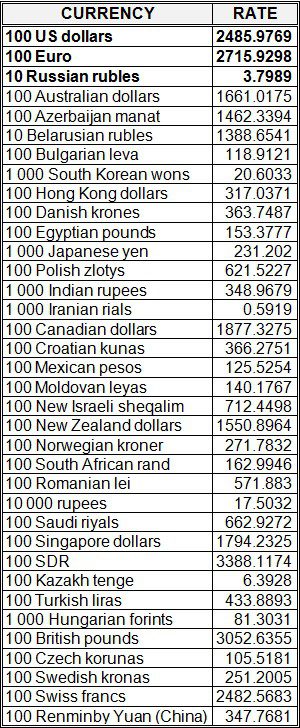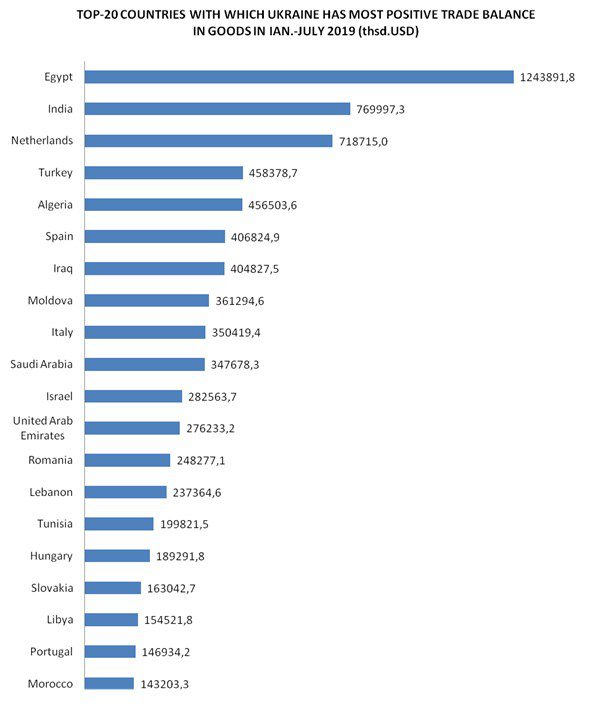
The growth of Ukraine’s gross domestic product (GDP) in April-June 2019 amounted to 4.6% compared to the same period in 2018, while in the first quarter the growth rate was lower and stood at 2.5%, according to preliminary data from the State Statistics Service, which confirmed its operational assessment dated mid-August this year. Fitch has said that after a strong Q2 2019 (4.6% year-over-year), Fitch projects 3.4% growth in 2019, reflecting strong domestic demand and exports driven by the agriculture sector (wheat harvest).
The deficit of Ukraine’s foreign trade in goods in January-July 2019 increased by 18.5% compared with January-July 2018, to $4.936 billion, the State Statistics Service has reported.
Actual inflation in August 2019 in Ukraine has approached the forecast of the National Bank of Ukraine (NBU) published in the inflation reform for July 2019, the regulator has reported on its website.
Consumer prices in Ukraine after falling in July 2019 by 0.6% in August fell by another 0.3%, and in annual terms inflation in August fell to 9% from 9.1% in July, the State Statistics Service of Ukraine has said.
The national budget of Ukraine in January-August 2019 posted a surplus of UAH 2.38 billion with the deficit of the general fund being UAH 4.12 billion, according to data on the website of the State Treasury Service.
Revenue of the national budget in August 2019 totaled UAH 87.6 billion, which is 6.9% less than in August 2019, and the outturn is 91%, according to data from the State Treasury Service of Ukraine.
Solvent Ukrainian banks in January-August 2019 received UAH 44.29 billion in net profit, which is 3.2 times more than in the same period in 2018, the National Bank of Ukraine (NBU) has said.
The consolidated profit of the National Bank of Ukraine (NBU) through January-June 2019 totaled UAH 6.4 billion, while its loss for the similar period of 2018 totaled UAH 1.1 billion, according to the first such kind of interim report posted by the central bank.
Ukraine’s international reserves in August 2019, according to preliminary data, rose by 0.8%, to $22.015 billion.
Industrial products (goods, services) worth UAH 1.485 trillion were sold in Ukraine in January-July 2019, which is 5.2% more than in January-July 2018 (UAH 1.411 trillion), in particular abroad for UAH 406.371 billion, the State Statistics Service has said.
Industrial prices in Ukraine in August 2019 decreased 0.7% after rising in July by 3.6% and falling by 2.7% in June, the State Statistics Service has said.
Sugar production in Ukraine as of September 24, 2019 amounted to 121,500 tonnes.
The transport enterprises of Ukraine in January-August 2019 increased freight transportation by 8.1% compared to the same period of 2018, to 442.9 million tonnes, the country’s State Statistics Service has said. The transport companies of Ukraine in January-August 2019 carried 2.808 billion people, which was 5.9% down year-over-year (y-o-y), the country’s State Statistics Service has reported.
The volume of construction work in Ukraine in August 2019 increased by 8.9% compared to August 2018, while in July 2019 from July 2018 this figure rose by 14.5%.
Retail trade in Ukraine in January-August 2019 increased by 9.9% in comparable prices compared with January-August 2018.
National bank of Ukraine’s official rates as of 03/10/19

Top-20 countries with which Ukraine has most positive trade balance in goods in Jan-July 2019 (thsd.USD)

Glovo international delivery service started its operations in Kherson, a company’s press service reported.
“Since October 1, residents of the city can use Glovo delivery services. This is the eleventh city on the Ukrainian map, where the Spanish service will operate delivering whatever you want within the city limits,” the report said.
Glovo couriers deliver almost everything that fits the size of a backpack up to nine kilograms. The cost of the Courier service is fixed and totals UAH 69.
Glovo (Spain) international delivery service started operation in Kyiv in October 2018.
Mykolaiv is the eighth Ukrainian city to welcome Glovo. The service has been already launched in Kyiv, Kharkiv, Dnipro, Odesa, Lviv, Vinnytsia, Zaporizhia, Poltava, Mykolaiv, Chernihiv and Kherson.

Metinvest mining and metallurgical group has placed 10-year $500 million eurobonds at 7.95% per annum and five year EUR 300 million eurobonds at 5.75% per annum, a source in banking circles has told Interfax-Ukraine.
The total demand for both tranches amounted to more than $1.1 billion in U.S. dollar equivalent.
The benchmark yield on bonds in U.S. dollars was 7.75-7.99% per annum, in euros – 5.75% per annum.
Metinvest held meetings with investors in the United States, the United Kingdom and continental Europe from September 18 through September 27.
Metinvest said on Tuesday that its offer of September 17 for a cash buyback on the amount of $440 million from $944.515 eurobonds due in 2023 with 7.75% coupon as part of the new bond issue was answered by holders of $639.391 million eurobonds.
According to the terms of the offer, other eurobond holders can still apply for redemption until October 15, inclusive, but they will no longer receive a 3% premium for early applications.
“The purpose of the offer is the proactive management of debt repayment, extending the maturity of the debt and reducing refinancing risks,” Metinvest said.
The buyback price for those who agree to sell before September 30 is 106% of the face value plus accrued interest. The results of the offer are to be summarized on around October 16 in order to carry out all settlements on October 17.

The average retail price of A-92 and A-95 petrol slightly grew from September 23 to September 30, by 0.04%.
The retail price of А-95 and A-95+ petrol did not change, according to Kyiv-based A-95 Consulting Group.
The average retail prices of diesel fuel rose by 0.04%, while the price of LPG dropped by 0.17%.
Changes in average retail prices of fuel in Ukraine, UAH per liter:

©Source: A-95 Consulting Company